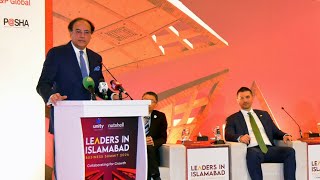Social spending not enough: IMF for promoting community and inclusive growth
ISLAMABAD: Countries in the region should not only focus on the size or volume of social spending but the efficiency as well as for promoting community and inclusive growth, said Jihad Azour, Director Middle East and Central Asia Department, International Monetary Fund (IMF).
The IMF in coordination with the IMF's Middle East Center for Economics and Finance (CEF) organised a virtual panel on social spending for inclusive growth in the Middle East and North Africa.
The discussion, moderated by Abderrahim Foukara, Washington bureau chief Al Jazeera, included Jihad Azour, director Middle East and Central Asia Department, IMF, Hiba Mohamed Ali Ahmed, acting minister of finance and economic planning, Sudan, Ruba Jaradat, assistant director-general and regional director for Arab states, ILO, and Nesrine Jelalia, executive director, Al Bawsala, Tunisia.
"We cannot promote our community unless invest in human resources which requires more spending on human capacity and training and to maintain social security stability unless there are efficient spending that can cover all population," said Azour.
He further said that the nutshell was, that only the volume of social spending was not enough but its efficiency and targeting should be taken into account as well.
The IMF official said that one of the key objective of the Fund was working or focusing on was inclusion due to existence of situations or conditions like huge disparity in income, bad targeting, lack of efficiency of fiscal methods, some categories did not enjoy protection through socio-economic process or benefit from government policies like the handicapped.
He said that the rate of unemployment in the region among the youth is very high, and this was not only in low-income countries but also in high income countries.
The IMF through its programmes is aiming at determining standards for instance, social spending, to make sure efficiency and transparency, and curbing any kind of corruption, he added. The countries of the regions should protect their individuals and put in place programmes that were not, in the past, he added.
"What we need to focus in the coming stage is to lower the gap between the able and the disable, empower the categories that do not have easy access to education, provide them training and women empowerment," said Azour, adding that there was a need to review fiscal polices as a whole including the taxation policies.
Over the past two decades, countries in the region have made significant progress against many socioeconomic indicators, such as life expectancy, infant mortality, poverty, and educational attainment. That progress has slowed, however, and the region lags global peers both in the level of social spending and in socioeconomic indicators.
The pandemic has magnified existing challenges and highlighted the deficiencies in health infrastructure and social safety nets. By disproportionately impacting the most vulnerable, the Covid-19 crisis is threatening to push millions into poverty and exacerbate economic and gender inequality.
The IMF's recently published paper highlights the importance of social spending-investing in health, education, and social protection-as a policy lever for supporting and promoting inclusive growth.
It also makes the case for improving spending efficiency, which is dependent on fiscal transparency, financial inclusion, and well-targeted social protection schemes. According to the IMF report, "Social Spending for Inclusive Growth in the Middle East and Central Asia", Pakistan's social spending is both inefficient and not enough, and should give priority to addressing spending efficiency before increasing its level to maximise impact per dollar spent.
The IMF stated that there was scope to increase the efficiency of public health care spending in the region.
"Lebanon, Mauritania, Pakistan, and Tajikistan are not spending enough and could see their gross school enrollment and expected years of schooling rise with larger education budgets. In countries that are spending both inefficiently and not enough (Mauritania, Pakistan, Qatar), priority should be given to addressing spending efficiency before increasing its level to maximize impact per dollar spent," it added.
Copyright Business Recorder, 2020
























Comments
Comments are closed.